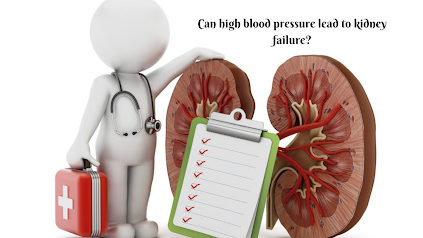Can high blood pressure lead to kidney failure?
High
blood pressure is a leading cause of renal diseases and kidney
failure. High blood pressure can constrict and narrow the blood vessels,
which eventually damages and weakens them throughout the body, including in the
kidneys. The narrowing reduces blood flow.
If
your kidneys’ blood vessels are damaged, they may no longer work properly. When
this happens, the kidneys are not able to remove all wastes and extra fluid
from your body. Extra fluid in the blood vessels can raise your blood pressure, even more, creating a dangerous cycle, and cause more damage leading to kidney
failure.
Symptoms of High
blood pressure and kidney diseases
Most
people with high pressure have no symptoms. In rare cases can cause a headache. People
may have CKD
but not know it because they do not feel sick. A person's glomerular
filtration rate (GFR) is a measure of how well the kidneys are filtering
wastes from the blood. GFR is estimated from a routine measurement of
creatinine in the blood.
Symptoms
of advanced kidney disease can include:
· drowsiness, feeling tired, or sleep problems
· headaches or trouble concentrating
· increased or decreased urination
· generalized itching or numbness, dry skin, or darkened skin
· weight loss
· muscle cramps
· chest pain or shortness of breath
How Can Prevent
Kidney Disease?
Many
people can keep their blood pressure under control by making lifestyle changes.
These changes include maintaining a healthy weight, limiting daily sodium
intake, exercising, and limiting alcohol and caffeine consumption. For others,
lifestyle changes are not enough to reduce blood pressure levels.




Comments
Post a Comment